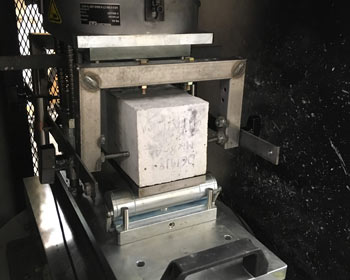

MPC Research Reports |
| Title: | Quantifying the Range of Variability in the Flexural Strength of Fiber Reinforced Concrete using Monte Carlo Simulation |
| Authors: | Ahmad A. Ghadban and Nadim I. Wehbe |
| University: | South Dakota State University |
| Publication Date: | Dec 2018 |
| Report #: | MPC-18-371 |
| Project #: | MPC-564 |
| TRID #: | 01699097 |
| Keywords: | admixtures, confidence limits, fiber reinforced concrete, flexural strength, laboratory tests, mix design, Monte Carlo method |
 Many laboratory studies have shown erratic flexural strength results among replicate specimens of fiber reinforced concrete (FRC). As a result, repeatability of results was very challenging. Given this issue, it would be very difficult for design engineers to make reliable claims about the performance of a certain FRC element in the field. The objective of this project is to attempt providing a better tool for FRC designers to be able to make more robust claims about the performance of an FRC element in transportation infrastructures. This was carried out through statistically quantifying the range of variability in the average residual strength (ARS) of FRC using Monte Carlo (MC) simulation. The power of the obtained MC prediction tool was examined through conducting laboratory compressive tests and average residual strength tests on four concrete mixes reinforced with steel fibers. These mixes had randomly selected fiber types, fiber dosages, and other concrete properties in order to examine the power of the developed tool for a wide range of mixes. Results from another four FRC mixes from a previous study were also used. Ranges of variability associated with several confidence levels were tested. Results showed success for some mixes and failure for others.
Many laboratory studies have shown erratic flexural strength results among replicate specimens of fiber reinforced concrete (FRC). As a result, repeatability of results was very challenging. Given this issue, it would be very difficult for design engineers to make reliable claims about the performance of a certain FRC element in the field. The objective of this project is to attempt providing a better tool for FRC designers to be able to make more robust claims about the performance of an FRC element in transportation infrastructures. This was carried out through statistically quantifying the range of variability in the average residual strength (ARS) of FRC using Monte Carlo (MC) simulation. The power of the obtained MC prediction tool was examined through conducting laboratory compressive tests and average residual strength tests on four concrete mixes reinforced with steel fibers. These mixes had randomly selected fiber types, fiber dosages, and other concrete properties in order to examine the power of the developed tool for a wide range of mixes. Results from another four FRC mixes from a previous study were also used. Ranges of variability associated with several confidence levels were tested. Results showed success for some mixes and failure for others.
Ghadban, Ahmad A., and Nadim I. Wehbe. Quantifying the Range of Variability in the Flexural Strength of Fiber Reinforced Concrete using Monte Carlo Simulation, MPC-18-371. North Dakota State University - Upper Great Plains Transportation Institute, Fargo: Mountain-Plains Consortium, 2018.